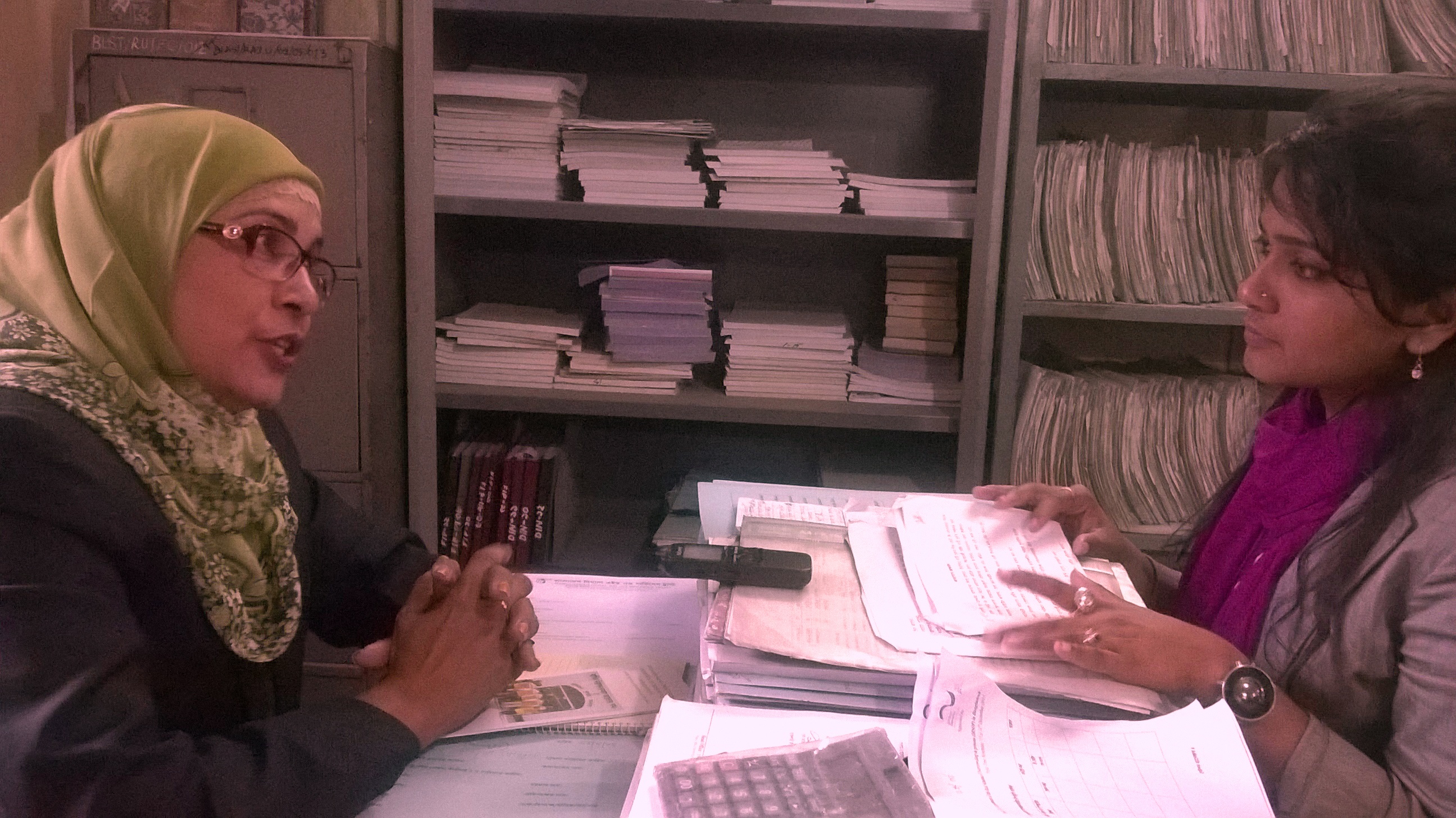Basic Information
“Khola Janala is a great initiative. It is really an urgent issue to inform and aware community people on govt. and non govt. legal assistance services and local service centres. I belive that if the community radio can continue with this awareness raising program in such a way , the justice department will gets relief from case jam and the poor and vulnerable people will not face in legal harassment anymore’’-said Prodip kumar Roy, Advocate, Kurigram Judge Court while he was attending one of the dialogue sessions of Khola Janala as a talker at Community Radio Chilmari.
`Khola Janala’, stands for open window, is an information and motivation program that has been broadcast in seven Community radio stations in Bangladesh. The radio stations are Community Radio Padma (Rajshahi), Community Radio Nalta (Satkhira), Community Radio Pollikontho (Moulvibazar), Community Radio Sagar Giri ( Chittagong), Community Radio Chilmari (Kurigram), Community Radio Jhenuk (Jhenaidha) and Community Radio Bikrampur (Munsiganj).
Through broadcasting the radio magazine program the community radio stations have been involved in increasing community awareness on improvement of the real situation of overcrowding in prisons under the project titled “Media Campaign through Community Radio on Improvement of the Real Situation of Overcrowding in Prisons in Bangladesh (IRSOP)’’. Bangladesh NGOs Network for Radio and Communication (BNNRC) has coordinated the project in collaboration with the Ministry of Home Affairs; Government of the People’s Republic of Bangladesh. The project was supported by Gesellschaft für Internationale Zusammenarbeit (GIZ) – Bangladesh.
Through the magazine program already .620858 million (6 Lac 20 Thousand, 8 hundred 58) listeners of the target areas (Audience 07 CR station coverage area in 07 districts of the country) became aware of legal protection and restorative justice which helped to resolve/mediate the conflict in an alternative way at local level. There was also a focus on speeding up the release of those detainees whose detentions were unlawful or disproportionate, especially women, children and other disadvantaged groups.
Project Description
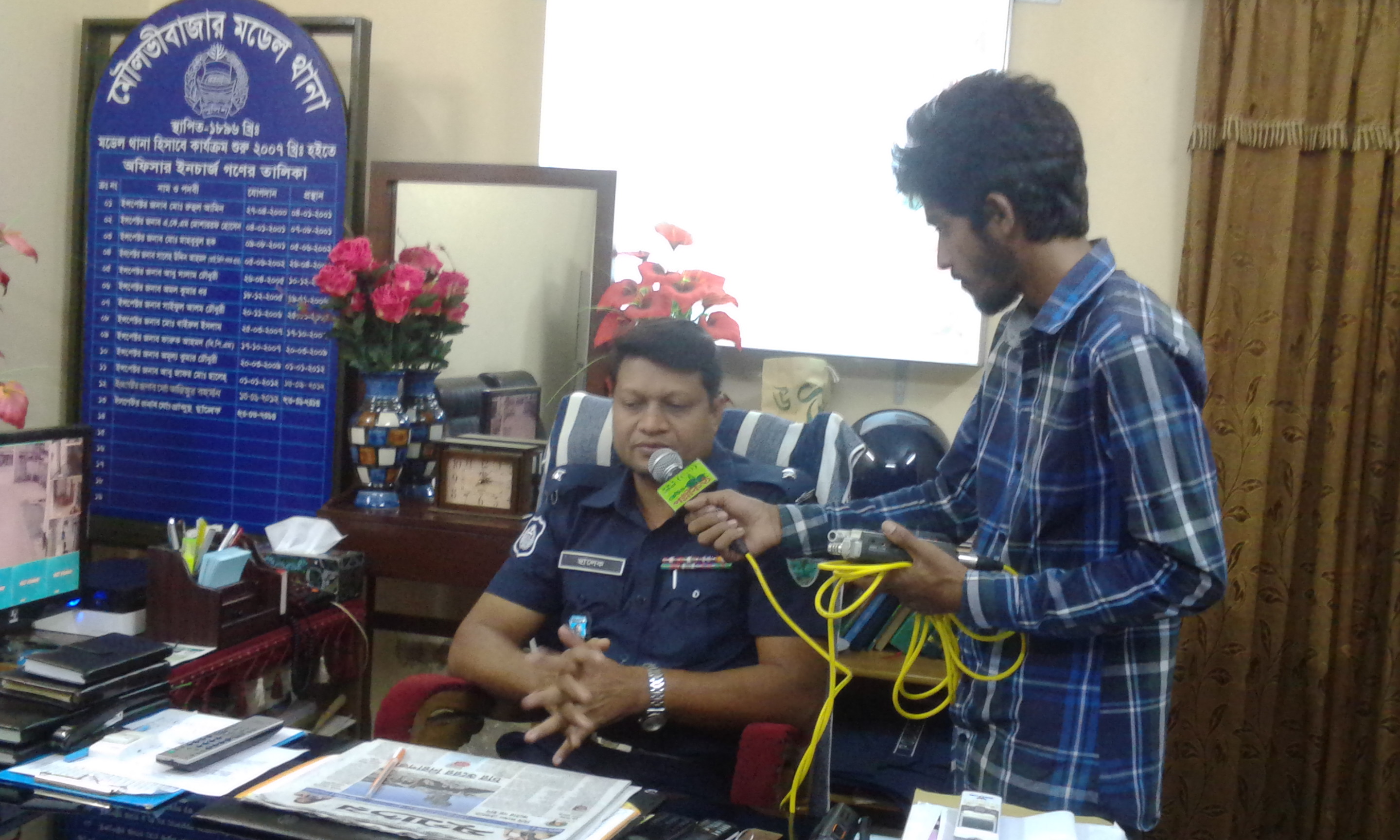 Prisons in Bangladesh are severely overcrowded by over twice of their actual capacity. This is due to an inefficient, irregular and anachronistic criminal justice system. Many prisoners spend months or years awaiting a court date. Many people are detained for minor offences which can be associated with poverty. Release on parole or on probation is uncommon. Women and children who have become victims of violent crimes, such as human trafficking or rape, are kept in prisons for their own ‘safety’ rather than because they have committed any type of crime, as they don’t have a safe place to stay.
Prisons in Bangladesh are severely overcrowded by over twice of their actual capacity. This is due to an inefficient, irregular and anachronistic criminal justice system. Many prisoners spend months or years awaiting a court date. Many people are detained for minor offences which can be associated with poverty. Release on parole or on probation is uncommon. Women and children who have become victims of violent crimes, such as human trafficking or rape, are kept in prisons for their own ‘safety’ rather than because they have committed any type of crime, as they don’t have a safe place to stay.
The conditions under which prisoners are held are appalling, contravening all international human rights standards.The number of cases to be resolved in low and higher courts already exceeds 3 millions, many of those are worthy to resolve at local level.Besides, in many cases police arrests without any specific charge and the arrested persons are not given the opportunity to deploy a lawyer.This has caused increase of priosners.
To reduce prison overcrowding and improve legal protection for the poor and vulnerable rural people BNNRC has implemented the information and motivation campaign project in 2015 with the following objectives:
- To reach the maximum number of listeners with information related to law and justice system.
- ii.To make community people aware about the services provided by Govt. and non-government organisations to access to the justice system and restorative justice through alternative resolution,
- iii.To reduce repeated crimes and referral system in case of drug addiction and thus contribute in reducing prison overcrowding and improving legal protection for poor and vulnerable prisoners.
The project activities were started through a day long orientation program, where total 21 youth and youth women (community radio broadcasters) from seven radio stations of the country had got better understanding, knowledge and gathered skills on how to produce an effective magazine program on the issues like: the situation of overcrowding in prisons, restorative justice through alternative resolution, legal assistance of govt. and non-government organisations to access the justice system, training & rehabilitation of prisoners, village court, reducing repeated crimes and referral system in case of drug addiction.
After receiving the orientation program the skilled radio broadcasters produced a radio program titled as “ Khola Janala’’. The program was designed in two segments; the first segment a magazine program,which was a combination of report, vox-pop, interview, promo, public service announcement (PSA), awareness song and drama. The second segment in the program was dialogue, where two local guests discussed on that broadcasting issue. They came from Jailor/ Jail Super/ members of Jail Inspection Committee, Advocate, and members of Para-Legal, representation of Social Welfare Department and Local government, Civil Society members, local NGOs and development workers etc.
To make the program interesting to the listeners, there was a quiz contest in each episode. They were awarded by radio sets. Besides a Facebook Group has been opened, which is named as `Khola Janala’ (www.facebook.com/groups/kholajanalbd/) as a web-platform for sharing information and opinion. All of the audio clips and pictures of the program episodes have been uploaded in the Facebook page.
Examples of Linkages between the WSIS Action Line and the SDGs
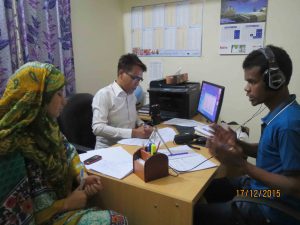 The project has addressed the Action Line C 3 (Access to Information and knowledge). Community Radio as an alternative media upholds the access to information of grass-root people in our society. In Bangladesh, the newly established Community Radio has created scope for the poor and marginalized community to raise their own voice for the voiceless. This neo-media outlet opened scope to establish their rights of information and communication in social, political, cultural and environmental area. In line with the United Nations SDGs, by increasing the accessibility of information for poor and vulnerable prisoners as well as grass-root people we can achieve the following objectives:
The project has addressed the Action Line C 3 (Access to Information and knowledge). Community Radio as an alternative media upholds the access to information of grass-root people in our society. In Bangladesh, the newly established Community Radio has created scope for the poor and marginalized community to raise their own voice for the voiceless. This neo-media outlet opened scope to establish their rights of information and communication in social, political, cultural and environmental area. In line with the United Nations SDGs, by increasing the accessibility of information for poor and vulnerable prisoners as well as grass-root people we can achieve the following objectives:
SDGs 16.3-Promote the rule of law at the national and international levels and ensure equal access to justice for all: The participation of poor justice seekers in media is an agenda for aiming access to justice for all, reduction of social inequality and to make easy their access to information.
SDGs 16.6- Develop effective, accountable and transparent institutions at all levels: Through radio talk show the program has created dialogue among local government and law enforcement officials, development workers, journalists, members of civil society, victims and community people. This has contributed in making the institutions accountable and transparent.
SDGs 16.10- Ensure public access to information and protect fundamental freedom, in accordance with national legislation and international agreements: The program has contributed in community access to information by using the direct media.
Highlights of the project’s partnership Activities:
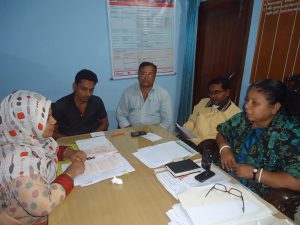 Santosh Kumar, the teacher of Kachkol Hat Mohirunnesa High School, Chilmari, Kurigram said“there was a longstanding conflict between me and my nephew Sudipto Kumar over a piece of land. As a sequel to the dispute, I decided to file a case against him. Meanwhile I listened the Radio Chilmari’s magazine program“Khola Janala’’. The issues of the program attracted me very much. I continued to listen. After listening all the episodes of the program I changed my decision. I communicated our local village court and immediately they resolved our dispute very peacefully. I’m very pleased with Radio Chilmari to broadcast such type of useful program’’.
Santosh Kumar, the teacher of Kachkol Hat Mohirunnesa High School, Chilmari, Kurigram said“there was a longstanding conflict between me and my nephew Sudipto Kumar over a piece of land. As a sequel to the dispute, I decided to file a case against him. Meanwhile I listened the Radio Chilmari’s magazine program“Khola Janala’’. The issues of the program attracted me very much. I continued to listen. After listening all the episodes of the program I changed my decision. I communicated our local village court and immediately they resolved our dispute very peacefully. I’m very pleased with Radio Chilmari to broadcast such type of useful program’’.
Although this is the first initiative in our country to focus on improvement of the real situation of overcrowding in prisons in Bangladesh with community radio, already the content of the program has made a huge interest within the target group. The listeners have given feedback, opinion and recommendation on the programs through sms, phone call, Facebook link, station visit and interview. Among them there were people from different strata of the society like-day labour, rickshaw-puller, farmer, fisherman, youth, teachers, students, journalists, family members of prisoners and drug addicted persons, advocate, development workers, govt. officials, local governmental officers, local public leader, related NGOs worker etc.
The program has created a strong linkage between local resource (and elite) persons and community radio as well as with the community people. The radio broadcasters are going to utilise this good link-up as reliable news source and call them as talkers in different radio programs.
In a recent discussion, Mr.Nazmul Hasan, the district magistrate of Satkhira district mentioned the “Khola Janala” a milestone program broadcast through community radio. He has participated in Radio Nalta (Kaliganj,Satkhira) as a speaker/discussant in one of the episodes.
Challenges and future perspectives for the project
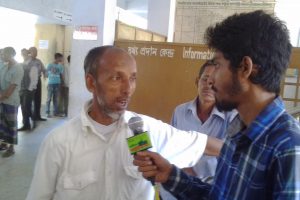 Access to the law and justice remains a major challenge in Bangladesh, particularly for the poor and vulnerable community. While the government propagates ‘access to justice for all,’ in reality the vast majority of the population has limited access to fair court proceedings. The reasons for this are manifold. The justice system lacks financial and human resources and it still operates with outdated colonial laws. Besides, there is a high level of corruption, and justice is commonly seen as a commodity rather than a right. Challenges not only came from the justice system; it was hard to convince the law or justice implementing organization or representative.A producer of Khola Janala Program Khrishana Kamol (Radio Chilmari) said `It was not easy to collect information on the topic/theme and to convince the resource persons like Jailor, Jail Super District Magistrate to come to the station who didn’t want to provide information due to their limitation. It was also hard to collect victim’s vox pop and interview (since they are a specialized group). By facing all those challenges, the program was running successfully under the coordination of BNNRC.
Access to the law and justice remains a major challenge in Bangladesh, particularly for the poor and vulnerable community. While the government propagates ‘access to justice for all,’ in reality the vast majority of the population has limited access to fair court proceedings. The reasons for this are manifold. The justice system lacks financial and human resources and it still operates with outdated colonial laws. Besides, there is a high level of corruption, and justice is commonly seen as a commodity rather than a right. Challenges not only came from the justice system; it was hard to convince the law or justice implementing organization or representative.A producer of Khola Janala Program Khrishana Kamol (Radio Chilmari) said `It was not easy to collect information on the topic/theme and to convince the resource persons like Jailor, Jail Super District Magistrate to come to the station who didn’t want to provide information due to their limitation. It was also hard to collect victim’s vox pop and interview (since they are a specialized group). By facing all those challenges, the program was running successfully under the coordination of BNNRC.
Among the recent programs broadcast through Radio Pollikontha 99.2fm the “Khola Janala” program has been certified as the most innovative program by “BRAC Social Innovation Lab’’ in the light of its content and important message on prisoners and their legal supports.
A transparent, accountable and development-oriented government is the key to a country’s progress and sustainable development. Through the magazine program, BNNRC in cooperation of GIZ BD has increased awareness on the justice system for the most vulnerable members of the society. It has also helped to ensure equal rights for women and men and increased women’s engagement with the justice system.
About: BNNRC
Bangladesh NGOs Network for Radio and Communication represents the community media sector to Government, Industry, Regulatory Bodies, Media and Development Partners.
BNNRC has been struggling for the last 17 years to open up the community media (including Community Radio, Community Television) and giving focus on its vital role as voices of the voiceless rural people. The reality of today is that the bondage between the community people and local-level community radio stations are getting strengthened day-by-day. Community Radio has now become their part of life and livelihood.


